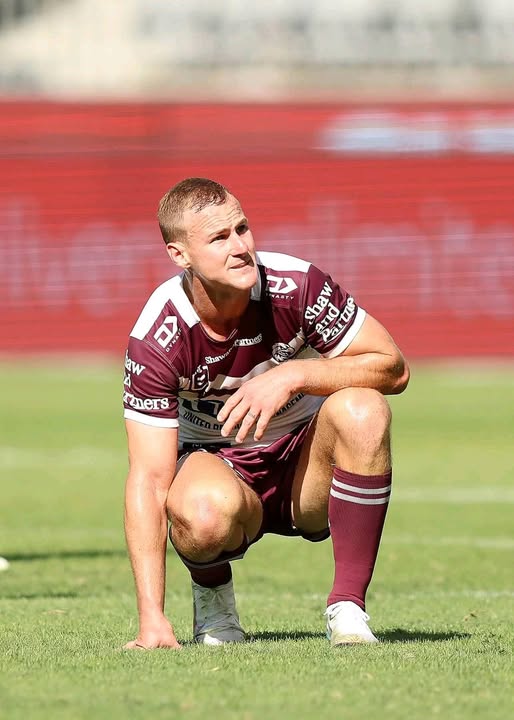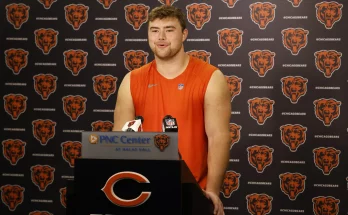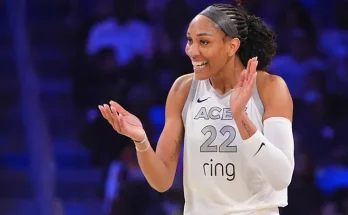Daly Cherry-Evans has long been one of the most divisive figures in Australian rugby league. Admired for his professionalism and leadership, yet frequently criticized for his elusive media persona and contract backflips, the Manly captain finds himself once again at the center of scrutiny. As the Roosters’ calculated move to bolster their roster backfires and Queensland coach Billy Slater rolls the dice on a bold Kalyn Ponga–Reece Walsh switch, the pressure is mounting on all fronts. But perhaps no one is under more pressure to be transparent with fans, media, and his own team than DCE himself.
With State of Origin looming and the Maroons still riding the wave of their dominant Game I win, Cherry-Evans’ influence has never been greater. At 35, he’s the elder statesman of Queensland rugby league, tasked with steering a talented yet youthful side through the white-hot crucible of Origin football. And while his leadership and poise are respected, there’s a growing sentiment that the veteran halfback needs to front up and clear the air about several lingering questions—his future with Manly, the whispers around retirement, and his relationship with Slater’s evolving selection strategy.
For years, Cherry-Evans has managed to duck and weave his way around uncomfortable narratives. Whether it was the infamous Titans contract saga or his strained rapport with past teammates, DCE has often allowed speculation to fester. In the public eye, he can appear rehearsed, calculated—even distant. But now, with the Roosters’ aggressive recruitment strategy crumbling and the Maroons making unorthodox gambles, the need for honesty and clarity has never been more crucial.
Over at Bondi, the Roosters’ audacious plan to stack their side with elite experience has started to unravel. What was initially seen as a masterstroke of recruitment is beginning to look more like a high-stakes misfire. The high-profile arrivals—some already showing signs of physical wear—have not gelled the way Trent Robinson had hoped. The cohesion is lacking, the spine looks disjointed, and the team’s identity has been clouded by star power rather than stability. In many ways, the Roosters have become a cautionary tale of recruitment excess. And while there’s no denying the club’s ambition, there’s also no hiding from the fact that they appear more vulnerable than they’ve been in recent memory.
That vulnerability has not gone unnoticed by Queensland or Billy Slater. Sensing blood in the water, the Maroons coach has made the eyebrow-raising decision to shift Kalyn Ponga—traditionally a mainstay at fullback—into a bench utility role while doubling down on Reece Walsh’s game-breaking ability in the No. 1 jersey. It’s a decision that could backfire spectacularly or pay off handsomely, and it speaks to Slater’s daring nature as a coach. After all, this is Origin—where loyalty is cherished but adaptability is king. For Slater, the bet is that Walsh’s electric speed and vision will tilt the scales in Queensland’s favor, while Ponga’s experience can still be an X-factor in patches.
But this is where Cherry-Evans must take ownership. He is the captain, the on-field general, and the bridge between the old and new eras. Walsh’s unpredictability, while thrilling, also demands a stabilizing presence beside him. That presence must be DCE—not just in terms of kicking and playmaking but in terms of communication, trust, and tactical discipline. With the Roosters faltering, NSW is sure to come back with venom, and any cracks in Queensland’s armor could be exploited with brutal efficiency.
Moreover, the Ponga gamble creates a potential fault line within the squad. For years, Ponga has sacrificed his body and taken big hits for the Maroons jersey. Demoting him from his preferred position isn’t just a tactical shift—it’s a cultural risk. The locker room harmony that has defined Queensland’s modern success depends on buy-in, and Cherry-Evans must ensure that no egos derail that balance. Publicly addressing the decision with support and understanding could be the leadership moment that silences DCE’s critics once and for all.
And that brings us back to the need for honesty. Fans are tired of ambiguity. Whether it’s about his future at Manly, his rep footy plans beyond this season, or his thoughts on Slater’s risk-taking, Cherry-Evans owes it to the public to speak with candor. There’s a hunger for insight that goes beyond clichés and soundbites. The modern rugby league fan is smarter and more connected than ever before, and they crave authenticity. If DCE wants to cement his legacy not just as a great player but as a beloved figure, it starts with transparency.
The Roosters’ implosion only magnifies this. Their recruitment missteps offer a lesson in ego management and the importance of culture over celebrity. DCE, having been courted by other clubs and having made headlines for big-money decisions, understands better than most how quickly narrative can shift. In some ways, his silence on certain matters mirrors the Roosters’ refusal to admit when their plans are going sideways. Just as Trent Robinson must eventually confront hard truths about his roster’s imbalance, Cherry-Evans must address the future with unfiltered honesty.
Then there’s the matter of succession. With Origin now as physical and fast as ever, it’s not unreasonable to think that DCE’s time in the No. 7 could be nearing its end. The likes of Tom Dearden and Sam Walker are waiting in the wings, and while Cherry-Evans still has the tools to dictate a game, the calendar waits for no one. Will he step aside gracefully? Or will the Maroons be forced into an awkward transition, similar to what’s unfolding at club level for the Roosters? These are questions that won’t go away, and the longer DCE stays quiet, the more control he loses over the narrative.
Walsh’s role further complicates this. The young Broncos star represents the next generation of Queensland footy: brash, bold, and bursting with confidence. He’s everything the modern game demands, but he’s also untested in true adversity. Cherry-Evans, for all his critics, has been there before—he’s lost series, won them back, captained against all odds, and survived more controversies than most. The mentorship he provides is invaluable, but mentorship without clarity can quickly become confusing. If DCE doesn’t set the tone, Walsh might set it for him, and that’s a risk Queensland can’t afford.
Off the field, the media noise will only grow louder. Former players, pundits, and fans alike are beginning to ask the hard questions. Why did Ponga accept a bench role? Can Walsh be trusted with a full 80 minutes at fullback under Origin pressure? Are the Roosters done as a powerhouse? And what does all of this mean for the twilight of DCE’s storied career? These conversations will shape the lead-up to Origin II, and the answers—or lack thereof—will determine whether Queensland marches toward a series win or stumbles under the weight of its own ambition.
It’s not too late for Cherry-Evans to take control of the story. A candid press conference, an open chat with respected media figures, even a sit-down with Slater to realign expectations could go a long way. Leadership isn’t just about action—it’s about communication. The great captains of the past knew this. Wally Lewis, Darren Lockyer, Cameron Smith—they didn’t just inspire with their play, they inspired with their words. DCE has the chance to do the same.
The situation is fluid, and rugby league, like life, rarely goes according to script. The Roosters will either adapt or implode. Walsh will either fly or falter. And DCE will either rise to the moment or fade into the shadows of his successors. But the one constant in all this chaos is the power of honesty. If Daly Cherry-Evans can stand in front of the cameras and the fans and finally say what needs to be said—about Manly, about Origin, about his role and his future—he might just turn the tide not only for himself but for Queensland as a whole.
In a season defined by risk, the biggest gamble might be silence. And for Daly Cherry-Evans, silence is no longer a viable option. It’s time to come clean.



